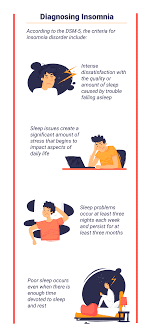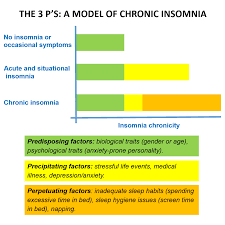The Impact of Severe Insomnia on Health and Well-being
Insomnia is a common sleep disorder that affects millions of people worldwide. While occasional difficulty falling asleep or staying asleep is normal, severe insomnia can have a profound impact on an individual’s health and well-being.
What is Severe Insomnia?
Severe insomnia is characterized by persistent difficulty falling asleep, staying asleep, or experiencing non-restorative sleep for an extended period of time. This chronic sleep deprivation can lead to a range of physical, mental, and emotional health issues.
Effects on Physical Health
Prolonged insomnia can weaken the immune system, making individuals more susceptible to infections and illnesses. It can also increase the risk of developing chronic conditions such as heart disease, diabetes, and obesity. Sleep deprivation disrupts hormonal balance, affecting appetite regulation and metabolism.
Impact on Mental Health
Severe insomnia is closely linked to mental health disorders such as anxiety and depression. Sleep deprivation can exacerbate existing psychological conditions and contribute to mood swings, irritability, and difficulty concentrating. Chronic insomnia may also increase the risk of developing cognitive impairments over time.
Social and Emotional Consequences
The consequences of severe insomnia extend beyond physical and mental health. Sleep deprivation can strain relationships, impair social interactions, and hinder performance at work or school. Individuals with severe insomnia may experience feelings of isolation, frustration, and helplessness due to their inability to get adequate rest.
Treatment Options
Managing severe insomnia often requires a multifaceted approach that addresses underlying causes and promotes healthy sleep habits. Treatment options may include cognitive-behavioral therapy for insomnia (CBT-I), medication therapy under medical supervision, relaxation techniques, lifestyle modifications, and addressing any underlying medical conditions contributing to sleep disturbances.
Conclusion
Severe insomnia is a serious condition that can significantly impact an individual’s quality of life. Seeking professional help from healthcare providers or sleep specialists is crucial for effectively managing chronic sleep disturbances. By addressing the root causes of severe insomnia and implementing appropriate treatment strategies, individuals can improve their sleep quality, overall health, and well-being.
Understanding and Managing Severe Insomnia: Answers to 8 Common Questions
- What causes extreme insomnia?
- How do you fall asleep with severe insomnia?
- Should you go to ER for severe insomnia?
- What can you do for severe insomnia?
- What is considered severe insomnia?
- What is it like living with chronic insomnia?
- What qualifies as severe insomnia?
- What to do for extreme insomnia?
What causes extreme insomnia?
Extreme insomnia, characterized by persistent and severe difficulty falling asleep or staying asleep, can be caused by a variety of factors. Common triggers include underlying medical conditions such as sleep apnea, restless legs syndrome, or chronic pain that disrupt normal sleep patterns. Psychological factors like stress, anxiety, depression, or trauma can also contribute to extreme insomnia. Lifestyle habits such as irregular sleep schedules, excessive caffeine intake, and poor sleep environments may exacerbate the condition. Additionally, certain medications, substance abuse, or hormonal imbalances can play a role in disrupting the sleep-wake cycle and leading to extreme insomnia. Identifying the specific cause of extreme insomnia is essential for developing an effective treatment plan to improve sleep quality and overall well-being.
How do you fall asleep with severe insomnia?
For individuals struggling with severe insomnia, falling asleep can be a daunting challenge. Establishing a consistent bedtime routine and creating a calming sleep environment can help signal to the body that it’s time to rest. Relaxation techniques such as deep breathing exercises, progressive muscle relaxation, or mindfulness meditation may also promote relaxation and reduce anxiety before bedtime. Avoiding stimulants like caffeine or electronic devices close to bedtime, as well as maintaining a comfortable sleep environment with proper lighting and temperature, are essential habits to support better sleep quality despite the challenges of severe insomnia. Consulting with a healthcare provider or sleep specialist for personalized strategies and potential treatment options is recommended for individuals dealing with persistent sleep difficulties.
Should you go to ER for severe insomnia?
If you are experiencing severe insomnia, it is generally not necessary to go to the emergency room unless your sleep disturbance is accompanied by other concerning symptoms or if you are in distress. In most cases, chronic insomnia can be effectively managed through consultation with a primary care physician, a sleep specialist, or a mental health professional. However, if your insomnia is causing extreme physical or mental distress, impacting your ability to function normally, or if you have thoughts of self-harm, seeking immediate medical attention at the emergency room may be warranted to ensure your safety and well-being. It is important to prioritize your health and seek appropriate care based on the severity of your symptoms and individual circumstances.
What can you do for severe insomnia?
For individuals struggling with severe insomnia, seeking professional help is essential. Consulting a healthcare provider or sleep specialist can help determine the underlying causes of the sleep disorder and guide the development of a personalized treatment plan. Treatment options for severe insomnia may include cognitive-behavioral therapy for insomnia (CBT-I), medication therapy prescribed by a healthcare professional, relaxation techniques, lifestyle adjustments, and addressing any coexisting medical conditions that may be contributing to sleep disturbances. It is important to approach severe insomnia comprehensively, combining therapeutic interventions with healthy sleep habits to improve sleep quality and overall well-being.
What is considered severe insomnia?
Severe insomnia is characterized by persistent difficulty falling asleep, staying asleep, or experiencing non-restorative sleep for an extended period of time. Individuals with severe insomnia often struggle to obtain sufficient rest despite making efforts to improve their sleep habits. This chronic sleep disorder can significantly impact one’s daily functioning, leading to daytime fatigue, irritability, cognitive impairment, and emotional distress. Severe insomnia may also be accompanied by physical health issues such as weakened immune function and increased risk of chronic conditions. Seeking professional evaluation and treatment is essential for individuals experiencing severe insomnia to address the underlying causes and improve their overall well-being.
What is it like living with chronic insomnia?
Living with chronic insomnia can be incredibly challenging and disruptive to daily life. The constant struggle to fall asleep or stay asleep can lead to persistent fatigue, irritability, difficulty concentrating, and mood disturbances. Simple tasks may become overwhelming, and the lack of restorative sleep can impact physical health, mental well-being, and overall quality of life. The relentless cycle of sleeplessness can create feelings of isolation and frustration as individuals navigate the ongoing battle with insomnia. Seeking support from healthcare professionals and implementing effective coping strategies are essential for managing the complexities of living with chronic insomnia.
What qualifies as severe insomnia?
Severe insomnia is typically defined by persistent difficulty falling asleep, staying asleep, or experiencing non-restorative sleep for a prolonged period of time. It goes beyond occasional sleep disturbances and significantly impacts an individual’s ability to function during the day. Qualifying factors for severe insomnia may include experiencing sleep difficulties three or more nights a week for at least three months, feeling fatigued or irritable during the day, having trouble concentrating or remembering things, and experiencing negative effects on overall quality of life. Seeking professional evaluation and guidance is important to properly diagnose and address severe insomnia to prevent further health complications.
What to do for extreme insomnia?
When faced with extreme insomnia, it is important to seek professional guidance and support to address the underlying causes and improve sleep quality. Consulting a healthcare provider or sleep specialist can help determine the most effective treatment options tailored to individual needs. Cognitive-behavioral therapy for insomnia (CBT-I), relaxation techniques, medication therapy under medical supervision, and lifestyle modifications are common approaches to managing extreme insomnia. Establishing a consistent bedtime routine, creating a sleep-conducive environment, and practicing relaxation exercises can also promote better sleep hygiene. Prioritizing self-care, stress management, and seeking professional help are key steps in addressing extreme insomnia and improving overall well-being.



